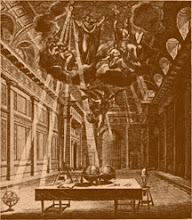We are living in the beginning of the post-capitalist era.
Consumer culture has been defined by disposable luxury. Just as we grew up watching our parents enjoy the fruits of the golden age of Americana, we are also increasingly burdening ourselves with bobbles and trinkets that are material and totally unfulfilling.
Our inner nature--our spirit, really--is starting to reject the accumulation of misspent energies, having earned to buy and bought, and gained no satisfaction for the effort, just a desire for more and better.
We are looking for more because our collective subconscious is waking up to the cultural vacuum that has been created by 40 years of folks being glued to their TVs and not talking to their neighbors.
Masonry, in some cases, has trouble speaking for itself because we don't know what to say anymore, and those who are entrusted with providing such rebuttal, response or statement, don't really know themselves.
There are currently four generations of men in this fraternity. Currently, the majority of decision-making offices are filled with folks who have an inherently different perspective than you or I, and perhaps just can't--or don't--want to see things differently. If you were in your twenties or teens in the forties, you’d see things differently, too.
Masonry doesn't recognize itself anymore. It's like Bro. Porter mentioned in his essay on his Lodge-building experience: most of the senior Masons are looking back at how things were the way their fathers described, who likely heard them from their fathers, and so on. It's been that long since things were really like that in Masonry.
Those who could speak for Masonry prefer not to, because the face of the Masonry of today is changing very quickly; and perhaps, in some cases, by the time you have formulated an all-encompassing statement, your response is no longer current.
Friday, February 1, 2008
Freemasonry and Pop Culture, by WB William A. Isabelle
Posted by
The Sanctum Sanctorum
at
2/01/2008 07:53:00 PM
![]()
![]()
Labels: Freemasonry, Pop culture, post-capitalist era, television
Subscribe to:
Post Comments (Atom)


No comments:
Post a Comment